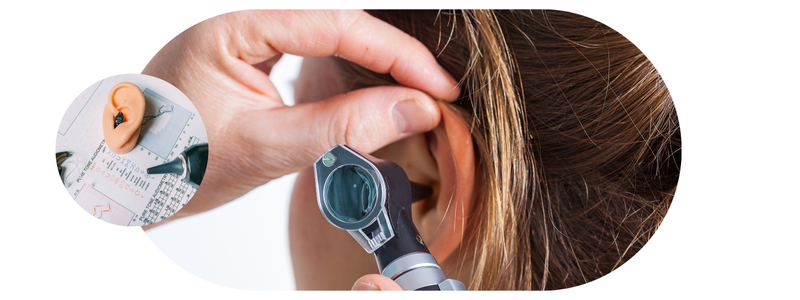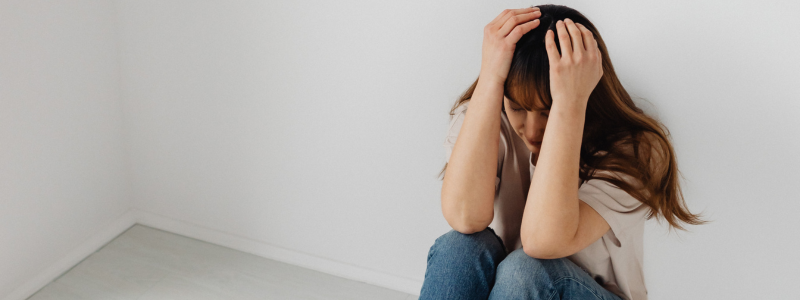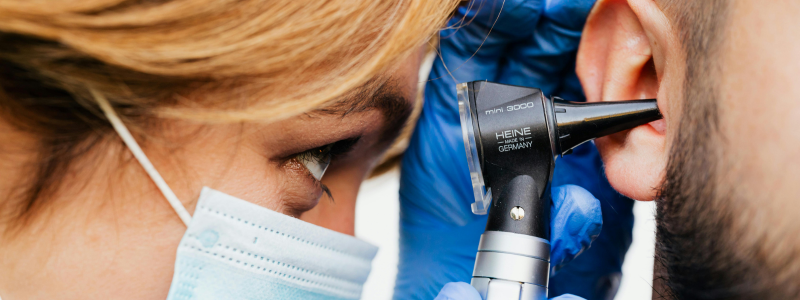
Head of Online Medical Content

Audiology Expert

I Can't Have Hearing Loss, I'm Too Young
Breaking the myth that hearing problems are just for older people
Overview | The truth about hearing Loss | Causes of hearing loss | Signs of hearing loss | The benefits of acting early | Conclusion
Last Hearing Aid UK Update: 24
Overview
If you're under 60 and experiencing hearing difficulties, you're probably not alone in thinking this. There's a persistent myth that hearing loss is exclusively an older person's problem, something that happens gradually after retirement.
The reality is that hearing loss can come at any age, and an increasing number of younger people are discovering they need help with their hearing far earlier than they expected.
The truth about age and hearing loss
Whilst it's true that age-related hearing loss (presbycusis) affects a significant portion of the over-65 population, millions of people under 50 experience hearing difficulties for various reasons.
According to recent data, approximately 1 in 6 adults of working age in the UK has some degree of hearing loss. That's rather a lot of people who technically should be "too young" for hearing problems.
Thinking that only older people can lose their hearing isn't ideal, as it often makes younger adults ignore their symptoms, not get help, and fight for years before finally getting their hearing checked.
By then, they may have missed out on important talks, job opportunities, and social events because they thought they were "too young" for hearing aids.
Related reading: Age-related hearing loss
What actually causes hearing loss in younger adults?
Hearing loss in people under 60 years old is usually due to:
Noise exposure: This is probably the most common one, and it's getting more and more common.
If you've spent years listening to music through headphones at high volumes, worked in loud places without proper protection, or gone to concerts often, you may have damaged your hearing from too much noise.
Genetic factors: Some people are just more likely to lose their hearing, no matter how old they are. If your parents or siblings had hearing problems when they were young, there's a good chance you will too.
Infections and illness: Severe ear infections, especially in children, can cause hearing loss that lasts a long time. Certain viral infections or medications can also hurt hearing at any age.
Hearing problems can happen at any age because of medical conditions like Ménière's disease, otosclerosis, or autoimmune disorders. Things like diabetes and high blood pressure can make it hard to hear, and these problems don't just happen to older people.
Head injuries: Head injuries can cause hearing loss.
The modern lifestyle factor
We live in an increasingly noisy world, and younger generations have grown up with technology that can damage hearing in ways previous generations never experienced.
Personal audio devices, whilst brilliant for entertainment, can deliver sound directly into your ears at potentially damaging levels for hours on end.
Add in noisy gyms, busy work commutes, and constant environmental noise, and it's hardly surprising that hearing loss is affecting people earlier than it used to.
Related reading: Types of hearing loss
Recognising the signs
Hearing loss often develops gradually, and you might not notice it yourself. You might just think everyone mumbles, or that TV sound quality has gotten worse.
Here are some common signs in younger adults. If several of these sound familiar, it's worth getting your hearing checked regardless of your age.
- Frequently asking people to repeat themselves, particularly in noisy environments
- Finding it harder to follow conversations in restaurants or at social gatherings
- Turning up the TV or music volume to levels others find uncomfortable
- Missing phone calls or doorbells
- Feeling exhausted after social events due to the effort of trying to hear
- Withdrawing from social situations because they've become too difficult
- Experiencing ringing in your ears (tinnitus)
The career impact
For younger adults, untreated hearing loss can have significant professional implications. Missing important details in meetings, struggling with phone calls, or having difficulty in collaborative work environments can genuinely affect your career progression.
In an increasingly competitive job market, anything that puts you at a disadvantage is worth addressing, and modern hearing aids are designed to be discreet enough that they needn't impact your professional image.
The social cost
Perhaps more importantly, hearing loss can be isolating at any age, but it's particularly difficult for younger people. Struggling to hear conversations or constantly feeling left out of group discussions takes a real toll on mental health and quality of life.
If you're worried that getting hearing aids means looking older, here's some reassuring news: modern hearing aids bear virtually no resemblance to the beige ones you remember from the past.
Today's devices are sleek, sophisticated pieces of technology that many people won't even notice you're wearing.
Premium hearing aids include features like Bluetooth connectivity, smartphone apps, and artificial intelligence (AI) that adapts to your lifestyle - they're more like wireless earbuds than medical devices.
Many younger hearing aid users actually find them quite cool once they get over the initial stigma.
Breaking down the stigma
There's also the embarrassment factor. Nobody wants to feel like they're "old before their time." But here's a thought: we don't think twice about people wearing glasses at any age, and hearing aids serve essentially the same purpose.
They're simply tools that help a sense organ work better. Would you struggle to see clearly because you thought you were too young for glasses? Probably not. The stigma around hearing loss is largely self-imposed and outdated.
The benefits of acting early
Getting help sooner rather than later is a big plus. Your brain gets used to hearing aids more easily if you deal with hearing loss early on, before years of not hearing have taken their toll.
When you deny your hearing, you won't have to deal with all the awkward social situations, misunderstood conversations, and missed opportunities that come up.
You can choose from a wider range of solutions and possibly stop your hearing from getting worse if you get help early.
Any kind of hearing loss doesn't get better on its own; in fact, they usually get worse over time. So, the problem won't go away if you wait.
Taking the first step
If you think you might be losing your hearing, the first thing you should do is get a hearing test. In the UK, you can usually get these for free from the NHS or a private audiologist like ours.
During the test, an audiologist will check your hearing in a variety of situations and frequencies. If you have hearing loss, they will talk to you about your options based on how bad it is, what kind of lifestyle you need, and what you like.
Conclusion
When it comes to hearing loss, age is really just a number. You're not too young for hearing aids if you can't hear well. Get a hearing test, find out where you stand, and if you need help, use the technology that is available.
Why Choose Us?
- FREE Hearing Tests
- Best Hearing Aids and Prices
- FREE Aftercare for Life
- FREE Home Visits
- 200+ Local Audiologists
- 60 Day Money Back Guarantee
Hearing loss doesn't discriminate by age, and neither should your care
Book a free hearing assessment with one of our qualified audiologists who can give you honest, straightforward advice about your hearing - no pressure, no judgment, just proper professional guidance.
Whether you're 25 or 55, we've helped thousands of people just like you take control of their hearing health.
Other hearing loss awareness articles you might like...
 Hearing aid stigma
Hearing aid stigma  How to tell if hearing loss is permanent or temporary
How to tell if hearing loss is permanent or temporary  Ways to keep your ears healthy
Ways to keep your ears healthy Our specialist service includes:
Do not spend hundreds of pounds without getting a second opinion from us.
Please call us on 0800 567 7621
 Not only are the prices great, but the service is fantastic! Many thanks to your team.
Not only are the prices great, but the service is fantastic! Many thanks to your team.Watch RNID video about hearing loss below
What's included in our hearing aid prices?
FAQs
In general, any audiologist will always recommend to you the hearing aid model that best suits your needs. Here is a useful checklist to make sure that is the case.
- Audiologist's level of knowledge: The audiologist you have seen will hopefully have a wide knowledge of all available hearing aids; however, some will only be familiar with a small number of brands and, therefore, may not really be in a position to know which model is the best for you. It is OK to challenge their recommendation and ask them to justify why this particular brand is the one for you.
- Do research: Read about the hearing aid that was recommended. Does it seem like it will suit your lifestyle? Does it have more or fewer features than you need?
- Be aware of sales targets: Many high street retailers have specific tie-ins to a particular manufacturer/brand. The hearing aid they have suggested may still be the correct one for you, but do your research so that you know why they might have recommended it.
If you have significant hearing loss in both ears, you should be wearing two hearing aids. Here are the audiological reasons why:
Localisation: The brain decodes information from both ears and compares and contrasts them. By analysing the minuscule time delays as well as the difference in the loudness of each sound reaching the ears, the person is able to accurately locate a sound source.
Simply put, if you have better hearing on one side than the other, you can't accurately tell what direction sounds are coming from.
Less amplification is required: A phenomenon known as “binaural summation” means that the hearing aids can be set at a lower and more natural volume setting than if you wore only one hearing aid.
Head shadow effect: High frequencies, the part of your hearing that gives clarity and meaning to speech sounds, cannot bend around your head. Only low frequencies can. Therefore, if someone is talking on your unaided side, you are likely to hear that they are speaking, but be unable to tell what they have said.
Noise reduction: The brain has its own built-in noise reduction, which is only really effective when it is receiving information from both ears. If only one ear is aided, even with the best hearing aid in the world, it will be difficult for you to hear in background noise as your brain is trying to retain all of the sounds (including background noise) rather than filtering them out.
Sound quality: We are designed to hear in stereo. Only hearing from one side sounds a lot less natural to us.
Fancy some further reading on this topic? You can read about why two hearing aids are better than one in our article, hearing aids for Both Ears, here
For most people, the main benefit of a rechargeable hearing aid is simple convenience. We are used to plugging in our phones and other devices overnight for them to charge up. Here are some other pros and cons:
For anybody with poor dexterity or issues with their fingers, having a rechargeable aid makes a huge difference, as normal hearing aid batteries are quite small and some people find them fiddly to change.
One downside is that if you forget to charge your hearing aid, then it is a problem that can't be instantly fixed. For most, a 30-minute charge will get you at least two or three hours of hearing, but if you are the type of person who is likely to forget to plug them in regularly, then you're probably better off with standard batteries.
Rechargeable aids are also a little bit bigger and are only available in Behind-the-Ear models.
Finally, just like with a mobile phone, the amount of charge you get on day one is not going to be the same as you get a few years down the line. Be sure to ask what the policy is with the manufacturer's warranty when it comes to replacing the battery.
For most people, the answer is yes. But it's never that simple.
The majority of hearing problems affect the high frequencies a lot more than the low ones. Therefore, open fitting hearing aids sound a lot more natural and ones that block your ears up can make your own voice sound like you are talking with your head in a bucket. Therefore, in-ear aids tend to be less natural.
However, the true answer is we can't tell until we have had a look in your ears to assess the size of your ear canal, and until we have tested your hearing to see which frequencies are being affected.
People with wider ear canals tend to have more flexibility, also there are open fitting modular CIC hearing aids now that do not block your ears.
There is also the age-old rule to consider, that a hearing aid will not help you if it's sat in the drawer gathering dust. If the only hearing aid you would be happy wearing is one that people can't see, then that's what you should get.
Most people can adapt to any type of hearing aid, as long as they know what to expect. Have an honest conversation with your audiologist as to what your needs are.
Generally speaking, six or more. Unless it's none at all. The number of channels a hearing aid has is often a simplistic way an audiologist will use to explain why one hearing aid is better than another, but channels are complex, and it is really not that straightforward. Here are some reasons why:
Hearing aids amplify sounds of different frequencies by different amounts. Most people have lost more high frequencies than low, and therefore need more amplification in the high frequencies. The range of sounds you hear is split into frequency bands or channels, and the hearing aids are set to provide the right amount of hearing at each frequency level.
Less than six channels, and this cannot be done with much accuracy, so six is the magic number. However, a six-channel aid is typically very basic with few other features and is suitable only for hearing a single speaker in a quiet room. The number of channels is not what you should be looking at; it's more the rest of the technology that comes with them.
As a final note, different manufacturers have different approaches. One method is not necessarily better than any other. For example, some manufacturers have as many as 64 channels in their top aids. Most tend to have between 17 and 20. One manufacturer has no channels at all.
Manufacturer's warranties typically last between 2-5 years, depending on the brand and model, and cover defects in materials and workmanship. This includes repairs for component failures, electronic malfunctions, and manufacturing defects, but excludes damage from misuse, accidents, or normal wear. Most manufacturers also include loss and damage insurance for the first year.
We handle all warranty claims on your behalf, liaising with manufacturers and ensuring you get replacement devices quickly when needed. This comprehensive warranty coverage, combined with our lifetime aftercare, gives you complete peace of mind.
Our hearing tests are completely free, whether at our clinics or in your home. Unlike other providers who charge £30-£100 for home visits, we believe hearing healthcare should be accessible without financial barriers. Our comprehensive assessments include examination by a registered audiologist, audiogram results, and personalised recommendations.
All testing, future adjustments, and ongoing support are included at no extra cost. While NHS tests are also free, typical 6-week waiting periods often lead people to seek immediate private testing. We provide prompt, professional assessments that fit your schedule and budget.
Yes, we offer completely free home visits throughout the UK, and this service is included in our prices with no additional charges. Home visits are particularly valuable for people with mobility issues, busy schedules, or those who simply prefer the comfort and convenience of their own environment.
Our audiologists can conduct full hearing tests, fit hearing aids, and provide ongoing support in your home. This service sets us apart from many providers who either don't offer home visits or charge extra for them.
We can offer prices up to 40% lower than high street retailers because of our business model. As a network of 200+ independent audiologists, we don't have the massive overheads of large retail chains - no expensive high street premises, no sales targets pushing audiologists to sell the most expensive options, and no costly marketing campaigns.
However, we maintain the same buying power as the big chains because we purchase on behalf of our entire nationwide network. This means you get access to the same premium hearing aids with professional service, but at genuinely competitive prices.
We offer a comprehensive 60-day money-back guarantee, which gives you twice the industry standard time to properly assess whether your hearing aids are right for you. This extended period recognises that adjusting to hearing aids takes time, and your brain needs several weeks to adapt to the amplified sounds.
Unlike many providers who offer just 30 days, we believe 60 days gives you the confidence to test your hearing aids in all the situations that matter to you - from quiet conversations at home to busy restaurants and outdoor activities.
Ask the Experts
6 Morton Lane
Walkwood
Redditch
Worcestershire
B97 5QA
Latest Launch
When we refer to a product as 'Latest Launch', we mean it is the latest to be released on the market.
New
When we refer to a product as 'New', we mean that the product is the newest hearing aid model on the market.
When we refer to a product as 'Superseded', we mean that there is a newer range available which replaces and improves on this product.
Older Model
When we refer to a product as an 'Older Model', we mean that it is has been superseded by at least two more recent hearing aid ranges.
